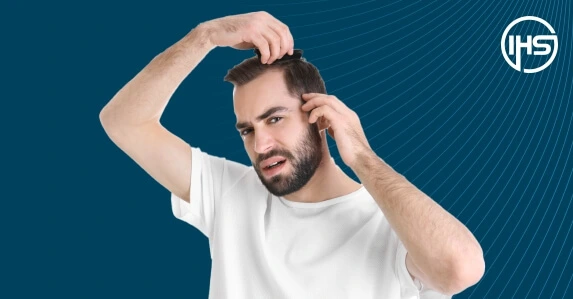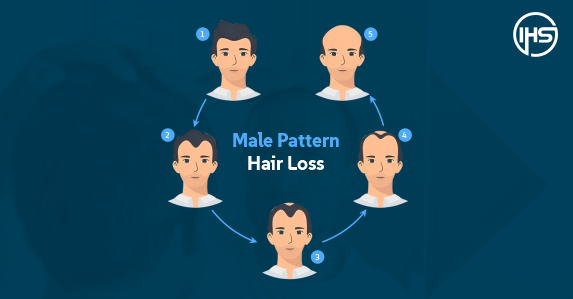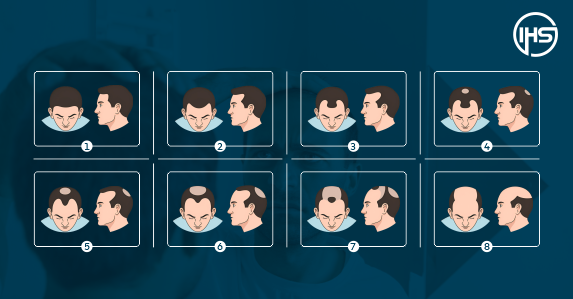



Contact our specialists now for Hair Replacement!
What are the risks of ignoring hair loss early on? Actually, this is the question nobody wants to face! But it is also true that we cannot control some aspects of our lives. So, here is the case.
Does hair loss bother you? Every day. Every minute. Every second. It does! – says a 28-year-old hair loss survivor, Carlie John one of IHS London’s client who noticed his first signs of hair loss at 19.
It is not just about being bald or experiencing hair loss. It’s about the judgment that comes with it.
We live in a world where looks often covers the essence of who we are. In a society that gives so much importance to looks, it can feel like our worth is measured by the hair on our heads rather than the person we are!
So, this blog is an indication for you if you are experiencing early signs of hair loss, such as gradual thinning, patchy bald spots or male pattern baldness– stop ignoring them because ignoring these signs can lead to more severe issues.
Trust us on this, taking action sooner rather than later is always the best thing to do!

Hair loss is a widespread concern in the field of dermatology, affecting both men’s and women’s quality of life.
Hair loss can range from mild hair thinning to total baldness.
Common types include male or female pattern hair loss, alopecia areata, and a thinning of hair known as telogen effluvium.
The cause of male-pattern hair loss is a combination of genetics and male hormones; the cause of female-pattern hair loss is yet not defined; the cause of alopecia areata is autoimmune and the cause of telogen effluvium is a physically or psychologically termed as stressful. Telogen effluvium is very common following pregnancy.
NOTE – About 2% of people develop alopecia areata at some point in time.
If you start to notice a little more hair in the shower or that bald patch that wasn’t there last month, it might be time to pay attention because identifying and addressing hair loss early can turn things around (in a better way).
Early hair loss consequences give you access to effective treatments easily. The reason is that your hair follicles are still active at the initial stage of hair loss, which can increase the chances of recovery and regrowth.
Gradual thinning and understanding at what age male pattern baldness happens are some early signs of balding. If not treated well, it can lead to more severe balding.
By recognising the signs early, such as increased shedding or visible thinning on the scalp, you can take quick steps and measures to stop further hair loss.
Hair loss is often linked with feelings of insecurity, anxiety, or even avoiding social gatherings.
Understanding the importance of early hair treatment will help you act calmly and purposefully according to the situation, minimising its emotional impact.
Early intervention often focuses on strengthening existing hair and preventing further damage. This improves your overall hair health, ensuring it stays stronger and healthier for longer.
Stopping hair loss early is much easier than regrowing hair once it’s gone. Dormant hair follicles can be reactivated, but dead ones? No chance.
Addressing hair loss early can also save you costs, delaying the same leads to extensive interventions later, which could be expensive.
Investing in early treatment, such as hair transplants or hair systems, can save you money and time.

Signs |
Symptoms |
|---|---|
|
Unusual hair shedding |
✔ Excessive shedding of hair when taking a shower or on the pillow than normal. |
|
Hair thinning |
✔ The low density of hair, specifically around crown or temple areas. |
|
Receding hairline |
✔ Hairline appears uneven. |
|
Widening part |
✔ Your hair part looks broader. |
|
Bald spots |
✔ Circular patches of hair loss on the scalp (Patches may increase over time if left unaddressed).
|
|
Scalp becomes more visible |
✔ Thinning areas expose more scalp. |
Due to damaged hair follicles.
Genetic predisposition (comes to you from biological family history).
Change in eating habits (rapid weight loss).
Living in stressful events.
Getting chemical hair treatments (Such as keratin, colouring, straightening, etc.)
Treatments like chemotherapy or radiation therapy.
Due to underlying health conditions like an abnormal thyroid, anemia, vitamin deficiency, etc.
Hormonal changes (pregnancy, menopause).
Due to medications and supplements (such as blood pressure medicines, gout medicines and high doses of vitamin A).
Hair shedding is not abnormal but is a natural part of the growth cycle.
Generally, individuals lose 50-100 hairs per day. During the hair growth cycle, hairs enter a resting phase called the telogen stage. Some of your hair falls out at the end of this 3- 4 month phase. In a normal scalp, hairs are in different stages of the hair growth cycle at different times.
So, when you lose some hair, other hair grows or becomes dormant. In a normal healthy person’s scalp, about 85% of the hair follicles are actively growing, and about 15% are considered resting. On the other side of the same story, hair loss occurs when something stops the hair from growing, and the consequences of ignoring hair loss are intense.
The medical term for this is “Anagen Effluvium”. Anagen effluvium means the abrupt loss of hairs that are in their growing phase (anagen) due to an event that impairs the mitotic or metabolic activity of the hair follicle.
Individuals cannot recognise the early signs of hair loss.
Individuals might feel embarrassed about losing their hair, leading them to ignore the signs.
Pressure from society leads individuals to avoid discussing their hair loss issues.
Individuals believe their hair loss is not that major and needs immediate action.
Individuals also fear that treatments might not perform well, can be painful, or even lead to side effects, which is described in Elton John’s Hair Loss Journey, where he tried 2 hair transplant procedures that miserably failed!
Ignoring hair loss early on means inviting permanent hair loss.
Treatments such as medications, non-surgical hair replacement system, or lifestyle changes work well if started early and delaying hair loss means losing the efficiency of these options.
Ignoring the issue leads to feelings of anxiety, depression, and low self-esteem.
If hair loss progresses, it will take you to more intensive and expensive treatments.
Ignoring hair loss means the scalp loses significant hair density, making it harder to achieve natural-looking results.
When people experience hair loss, they feel like they are losing a part of themselves, which leads to feelings of unattractiveness and ageing that can diminish self-esteem. However, effective hair loss prevention can save an individual from such feelings.
Studies have shown that individuals with hair loss are at a higher risk of developing psychiatric disorders such as major depressive incidents and anxiety disorders.
Hair loss affects one’s appearance, forcing individuals to avoid social interactions. But, adopting instant hair loss solutions, such as hair toppers or hair wigs, will give individuals the confidence to walk on the floor with pride.
Hair loss can also affect professional life. Individuals may feel less competent in their roles because of the perceived judgments based on their appearance rather than their abilities.
Non-surgical hair replacement systems are the best because of their practicality and convenience. They do not involve any risks, medications or surgical techniques.
They are customisable, allowing each hair system to be the same as the individual’s scalp (head) size, hair density and colour.
Unlike surgical procedures, hair systems have no recovery periods, making them safer for those with sensitive scalps or pre-existing health conditions. Also, they are perfectly suitable for minor to major types of hair loss. They also do not damage existing hair, making them ideal for people with partial hair loss or thinning hair.
These systems also allow individuals to take full control, allowing changes in style or removal without permanent dependency.
No, wearing hats or helmets cannot cause hair loss. But wearing it for a longer time can cause hair loss because of the heat generated from within.
Yes, stress can cause hair loss; to manage it, one can practice mindfulness and exercise and should take proper nutrition.
Hair loss can affect confidence and self-esteem by impacting self-image, increasing social anxiety and causing individuals to feel less attractive.
Hair fall is a common complaint, but paying attention to early signs of hair loss is very important to avoid permanent damage.
If you observe symptoms of hair loss such as excessive hair fall or hair thinning, contact IHS London, a non-surgical hair replacement studio which has a team of expert trichologists who can advise you on the right hair loss solutions that are risk-free, involves no surgeries and offer instant results with customised hair systems.

IHS Hair Replacement is a hair replacement brand based in 2 prime locations, West Kensington in West London and Liverpool Street in Central London. We provide a full head of hair achieved through our hair integration procedure giving you confidence and life.